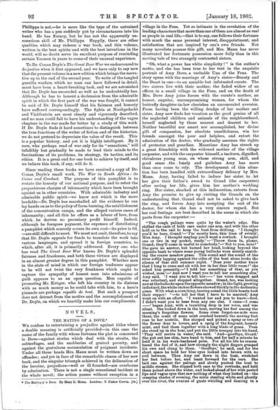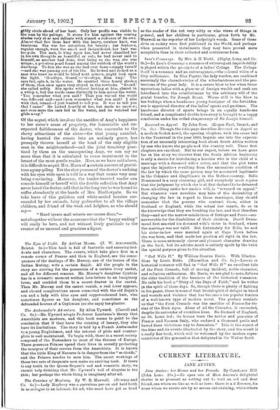NOVELS.
THE MATING OF A DOVE.* • •
WE.confeas to entertaining a prejudice against titles where
, a double meaning is artificially provided—in this case the • name of the family with whose fortunes the plot is concerned is • Dove--against. stories which deal with the straits, the subterfuges, and the snobberies of genteel poverty, and against the gratuitous accumulation of poignant incidents. Under all three 'heads Mrs Mann must be written down an offender; and yet in face of the remarkable charm of her new book, and the singular triumph achieved in the delineation of the heroine, prejudices—well or ill founded—are overborne by admiration. There is not a single sensational incident in the whole 'novel; the action passes without exception in a
• The Mating of a Dors. By Mary E. Mann. London : T. Fisher Unwin. Ds.] village in the Fens. Yet so intimate is the revelation of the leading characters that more than one of them are almost as real as people in real life,—that is to say, one follows their fortunes with much the same personal interest, disappointment, and satisfaction that are inspired by one's own friends. Not many novelists possess this gift, and Mrs. Mann has never illustrated her fortunate possession more fully than in this moving tale of two strangely contrasted sisters.
"Oh, what a power has white simplicity ! " is the author's motto, and she has been true to her text in the exquisite portrait of Amy Dove, a veritable Una of the Fens. The story opens with the marriage of Amy's sister—Beauty and the Beast in one—to an amiable but infatuated curate. The two sisters live with their mother, the faded widow of an officer, in a small village in the Fens, and on the death of Mrs. Dove Amy joins forces with the curate's mother, an honest, angular, uncompromising woman, for whom the butterfly daughter-in-law cherishes an unconcealed aversion. From having been the willing drudge of her mother and sister, Amy now finds her vocation as the good genius of all the neglected children and animals of the neighbourhood, herself neglected by those nearest and dearest to her. Neither beautiful nor smart nor accomplished, her divine gift of compassion, her absolute unselfishness, win her friends amongst , the poor and helpless, and extort the admiration of the doctor, who gradually assumes the rights of protector and guardian. Meantime Amy has struck up a great friendship with the widowed mother of the village carpenter, and with the carpenter himself, a taciturn, dignified, chivalrous young man, on whose strong arm, skill, and good sense ',the lonely, and guileless Amy has more than once come 'to: rely. The development of, this situa- tion has been ,handled with .extraordinary delicacy by lMrs. Mann. Amy, having failed. to . induce her sister, to let her give their father's . sword to Grand (the carpenter) after saving her life, gives, him her . mother's wedding ring. Her ,sister, shocked at this indiscretion, extorts from Amy the promise to give up ,visiting the Grande on the understanding that , Grand shall not be asked to give back the ring, and forces Amy. into accepting the suit of the doctor, for whom she .has a very sincere regard. But her real feelings are best described in the scene in which she
parts from the carpenter:— ' • •
"The, rough palings were quite by the water's edge. She shifted the ends of both oars under one arm, and with the other held on to the rail.to keep the ,boat from drifting.. I thought you'd be here, Grand.'' I'm' mostly here, this time of eiedin', Miss Amy. • I thought mayhap you'd want a rowlock. I brought one or two in . my .pocket, ready.' Throw them in, please, Grand; they'll come in useful.to somebody.'—' Not to you, miss?' She gave no answer, but turned her head, looking beyond the opposite bank to where some young bullocks were noisily snatch- ing the coarse meadow grass. This sound and .the sound of-the river softly lapping against the'sicles,of the boat alone broke the silence of that still summer night. Does your mother know that I long to come and sit with her in her dear little room?' she , asked him presently.—' I told .her something of that; as you
wished, And now I want you to tell. her something else,' Amy said. want you to tell her—' her voice dragged and
was reluctant, and stopped altogether. Grand, too, was looking now at thebullocks upon the opposite meadow; in the light, growing indistinct, the white cuckoo flowers showed thickly in the darkening grass With what a crunching, tearing sound the little beasts took their supper! —to tell her that I have to be married,' Amy went on with an effort. I wanted her and you to know—first. I didn't want you to hear from any one else. I came—I came —' began Amy, with a trembling drop in her voice, and. was silent. She looked down in the boat, moving her foot among the morning's forgotten flowers. Some river forget-me-note.were -there, the scent of some mint crushed beneath the moving foot rose to her nostrils. She stooped and picked a spray or two of the flower dear to lovers, and a sprig of the fragrant, homely mint, and tied them together with a long blade of grass. Then she stood up in the boat, and put the little nosegay into his hand. They will revive in water,' she said. And—goodbye, Grand.' She put out her slim, bare hand to him, and for half a minute he held it in his work-hardened palm. For all his life he remem- bered the feel of it, and how strongly the slight fingers grasped his own and clung to them. Goodbye,' he said, and for the short space he held her blue eyes looked into brown with no evil between. Then Amy sat down in the boat, stretched her feet before her, and leant forward for the oars. • She laid one against the palings and slowly pushed the boat to middle stream. She slipped both oars to the rowlocks, and held them poised above the water, and looked ahead of her with parted ‘lips and vague eyes that saw nothing of what they looked on- the creeping shades of evening, the mists stealing white and ghostly over the river, the swarms of gnats whirling and dancing in a giddy. circle ahead of her boat. Only her profile was visible to the man by the palings. It shone rr him against the coming shades very clear and delicate with almost a radiance of its own. Almost that fair loose hair with the heavy, careless knot, was luminous. She was too colourless for beauty ; her features, regular enough, were too smell and insignificant, her hair was too pale. The man, la king upon her, had never classified her in his-own thoughts as beautiful or not ; he had never said to himself, as another had done, that being as she was, she was unique, a priceless pearl found among the rubbish of the world's dustheap. To him she was as she had ever been—simply herself —and she was passing out of his life. He looked and looked as a man who knew he would be blind next minute, might look upon the light. 'Goodbye, Grand.'—' Goodbye, Miss Amy.' The oars fell, splia-h, in the water. He counted three heavy strokes of them, then once again they stayed in the rowlocks. Grand,' she called softly. She spoke without looking at him, almost in a whisp,r, but the words came distinctly to him across the water. 'You remember what you said ? That you wished the world was diffeient and—and—you remember what you said? I also wish that, Urand—I just wanted to tell you. It was to tell you that I came.' He looked heavily at her, but Made no answer ; and once more the oars fell in the water, and he watched her glide away."
Of the sequel, which involves the sacrifice of Amy's happiness to her sister's sense of propriety, the lamentable and un- expected faithlessness of the doctor, who succumbs to the showy attractions of the sister—for that young cannibal, having harried the curate into an untimely grave, has promptly thrown herself at the head of the only eligible man in the neighbourhood—and the joint treachery prac- tised by them on the unsuspecting Amy, we can say no more than that it is calculated to rouse resentment in the breast of the most gentle reader. Here, as we have said above, ibis difficult to acquit Mrs. Mann of a certain amount of gratui- tous agony-piling Yet the slow process of the doctor's undoing with his eyes wide open is told in a way that comes very near being convincing. Moreover, the tender-hearted reader can console himself or herself with the double reflection that Amy never loved the doctor, a,lcl that in the long run he was bound to suffer abundantly at the hands of Mrs. Shallowpate. So we take leave of this guileless and white-souled heroine sur- rounded by her animals, fairy godmother to all the village children, and friend of the weak and helpless, as who should say- " Hand ignara mall miseris snceurrere disco,"—
not altogether without the assurance that the "happy ending" will really be hers, and not without lively gratitude to the creator of so unusual and gracious a figure.







































 Previous page
Previous page